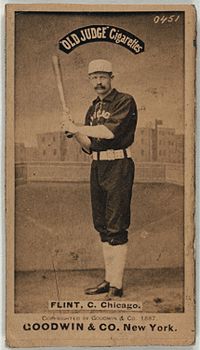

I am not going to say this man played in the time where there was no protective equipment because that is simply not true. However, in Flint's first MLB season of 1875 for the National Association's St Louis Blue Stockings, there was no evidence of protective equipment being used by catchers. The position at the time, was played with the catcher staying far away from home plate and retrieving the ball from the backstop off the ground after it was pitched.
Over the time Flint played, the evolution of protective equipment went from mouth guards to having face masks and eventually shin guards and chest protectors. In the 1880s, catchers started to crowd closer to the plate- putting themselves in great danger. This happened to be right in the middle of Flint's career.
Being a catcher at that time was something few wanted to do. In fact, few that played the position would end up having long careers. It certainly took a tough ballplayer to handle the position. In addition, catchers commonly made more errors than any other position, understandably. If the physical abuse wasn't enough, the mental effects of the extra runs being allowed to score had to take its tole on the catcher. It is also easy to understand why it was difficult for catchers of that time to hit, even with the gradual advancements in technology.
The fact that Silver Flint was a five time NL Champion and one and a half time World Series Champion (the 1885 World Series ended in a tie, they won the 1886 WS) and a pioneer of his position should make up for the fact that his numbers for his 13 year career were not so dominant. It also needs to be brought up that few were able to handle the position for as many consecutive seasons as he did at that time. Also interesting is the fact that Flint played just about every inning of every game for his first 6 seasons, which was unheard of. For his career, Flint hit .236 with 687 hits, 295 RBI (RBI was a legitimate stat in the pre-live ball era) and his .595 OPS is an indication that his defense took a tole on his offense.
Like many people, not just athletes, at the time, Flint was a heavy drinker. After he finished playing, it was probably not a good idea for him to open up a bar. But who am I to complain about it some 125 years later? It was the drink that killed Frank "Silver" Flint on January, 14, 1892. RIP

 RSS Feed
RSS Feed
